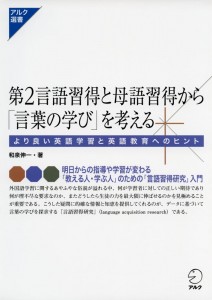Recently our own Department of English Studies Chair, Professor Shinichi Izumi sat down with the student editors of Angles to discuss his new book, Thinking about Language Learning from the Perspectives of First and Second Language Acquisition Research (Second Language Acquisition, for short) (『第2言語習得と母語習得から「言葉の学び」を考える』 アルク選書、2016).
Second Language Acquisition is the third in a series of books Professor Izumi has published. After publishing his first and second books, which were mainly for teachers, Professor Izumi was ambitious to write a book that was not only for teachers but for students as well. 
Angles Editors: What inspired you to write this book?
Professor Izumi: This is actually my third book. I published my first book in 2009 and that’s called “Focus on Form.” “Focus on Form” is the idea of teaching language forms in a meaningful language context. It is different from just focusing on grammatical forms all of the time, but if you don’t focus on form, but only focus on content and talking and discussing, which is called “focus on meaning,” learners often fail to acquire some important grammatical forms. So, focus on form is kind of the middle approach and that’s really missing in English education in Japan right now. After that book got published, many teachers read it and they enjoyed it and I really appreciated it, but at the same time they told me they wanted something more practical, something they can use in their teaching. Then, I decided to write another book, this time about practical issues and ideas that teachers can use in junior high school and high school. But then, I had this ambition in my mind. Practical is very good, but I believe that practice needs to be based on something that is solid; it needs to be based on well-established principles that we know from second language acquisition research. I really wanted to go back to research and think about how languages are learned, both first languages and second languages, and I wanted teachers as well as learners to know the background. So, in this book I am going back to the basics.
What makes this book most different from his others, is Professor Izumi’s decision to include his own personal stories and experiences. Although he had been encouraged by other teachers to include more of those experiences, he had a difficult time deciding if he should and where those stories would go, because he felt he should remain as objective as possible. But in the end he decided he wanted the readers to feel more “familiar” with him by including his personal stories and experiences in the book.
Angles Editors: Did you face any difficulties writing this book?
Professor Izumi: Always. Always. Writing is hard. Book writing is especially hard because you are writing a whole book. It’s a long term process that requires research, time, motivation, concentration, and perseverance. When I write, my first draft is really focused on meaning, not form. I try to get out my ideas and put it down on paper before I forget, that’s what I try to do. So, this time, as in my previous times, I wrote and wrote and researched and wrote and read and wrote. I tried to write at least 5 pages a day. I was able to finish my first draft in 3 months. But that was only a first step in my book project. I went back to the beginning and re-read and started revising the entire book. That’s when really shocking things happen because you realize how messy the first draft really is! And then the polishing process begins.
After Professor Izumi finished his first draft, he said he spent the next several months re-reading and revising the draft again and again. He said that his book went through almost 10 major drafts. “It’s a very time consuming, hard process, but it’s a very creative process as well.”
While doing research to write this book, his ideas towards second language acquisition continued to expand and became much more clear. The ideas and theories that he had before became more practical and more specific. “Writing involves self-growth,” he said. “You continue to learn through the process of writing, so writing is not just a matter of taking out and putting down what you already have inside you and leaving it at that. It’s a continual process of discovery and growth, or at least it should be.”
Professor Izumi wants teachers to feel encouraged to try out new things in their classes, and not to be afraid of teaching English in English. “I feel very pleased when I get comments from teachers saying ‘I’ve been encouraged’ because that encourages me.” He wants teachers to focus not only on the language forms but also on the contents and messages, so they can come up with specific ideas about how they can actually approach language teaching in more “interesting, creative and innovative ways.”
He also wants the students to be encouraged and not to be constrained by feeling that they have to study English. “They are feeling really constrained by thinking that English is a subject to study, that they have to memorize, they have to understand, and they have to be accurate all the time. But in this book, I am writing that accuracy is not the first priority. If you make it the first priority, usually you will be stuck. Accuracy is something that comes at the end and that’s revealed by first language acquisition and second language acquisition research. So, it’s not your fault, it’s not your teacher’s fault, it’s nobody’s fault, that’s just the way it is. I want the students to feel encouraged and then try to listen more, read more, speak more, and write more. I want them to really focus on form in a meaningful context and realize that’s how language is used in that context.”
Angles Editors: Being a teacher—I taught students during teacher training—and they feel they can’t do it because they can’t memorize the grammar.
Professor Izumi: Grammar is much better understood and assimilated and remembered if it is put into meaningful context. It’s really hard for students to memorize a lot of vocabulary or grammar rules out of context or when they are presented devoid of meaning. That’s really hard for the brain. Our brain is not made that way; our brain looks for meaning, and that’s just human nature.
To read more of Professor Izumi’s conversation with our Angles Editors, please check out the second part of the interview where Professor Izumi discusses the start of his academic career and his vision for the future of English Education in Japan.



















